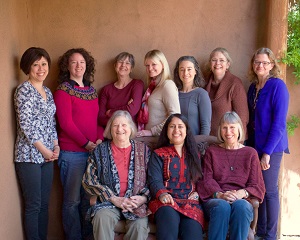ADVANCED SEMINARS / 2015 / The Psychology of Patriarchy

The Psychology of Patriarchy
Co-chaired by Adriana Manago and Holly F. Mathews
April 19–23, 2015
The Psychology of Patriarchy
While scholars working in Middle Eastern societies have carefully defined patriarchal systems and delineated many of their key structural features, few have investigated the psychological factors that lead certain individuals to either accommodate or resist their attendant beliefs and practices. Bringing together an interdisciplinary group of scholars with extensive field research experience in cultures where patriarchal beliefs and practices continue to impact the daily lives of women, this seminar was organized to develop new theories explicating the ways that culturally situated systems of patriarchy, family, and power are both shaped by and constitutive of individual desires, goals, and identities.
“Our purpose,” reported co-chairs, Adriana Manago and Holly Mathews, “was to investigate how patriarchy works psychologically and to probe the reasons why women sometimes adhere or accommodate to ideologies that oppress and disenfranchise them while at other times they resist and subvert them.” Naomi Quinn pointed out that all of the participants’ papers seemed to be asking what the “sticky” parts of patriarchy are in today’s societies and why they remain so. This led to a focus on issues of motivation leading the participants to concentrate their discussions on the question: what innate human proclivities are being recruited and reinforced through processes of child socialization in patriarchal families, and how are these deeply internalized patriarchal beliefs and practices reinforced or ameliorated by state policies, local circumstances and larger historical moments?
Themes that emerged from the seminar included the exploration of the hierarchical socialization of patriarchy; changes in ideas of family and the mechanisms of socialization that underlie patriarchy in areas of the world where women are exposed to the development discourse of NGOs and to new educational opportunities; how state policies, or the lack of them, influence the way that patriarchal ideologies are constructed and enacted; and, the breakdown of patriarchal systems under conditions of socioeconomic development and long-term immigration.
Compiling and publishing an edited volume is one of the next steps for the members of the seminar. In addition, participants discussed the importance of developing a future seminar that would address the psychological workings of patriarchy from men’s perspectives.
Adriana Manago, Chair
Assistant Professor, Department of Psychology, Western Washington University
Holly F. Mathews, Chair
Professor, Department of Anthropology, East Carolina University
Kelly H. Chong
Associate Professor, Department of Sociology, University of Kansas
Leta Hong Fincher
Lecturer, Department of Sociology, Hong Kong University of Science and Technology
Gülden Güvenç
Professor and Chair, Department of Psychology, Işık University, Istanbul, Turkey
Ayesha Khurshid
Assistant Professor, Department of Educational Leadership and Policy Studies, Florida State University
Jocelyn Marrow
Senior Study Director, Department of Health Studies, Westat Corporation
Naomi Quinn
Professor Emerita, Department of Cultural Anthropology, Duke University
Susan Seymour
Jean M. Pitzer Professor Emerita, Department of Anthropology, Pitzer College
Cynthia A. Werner
Associate Professor and Chair, Department of Anthropology, Texas A&M University